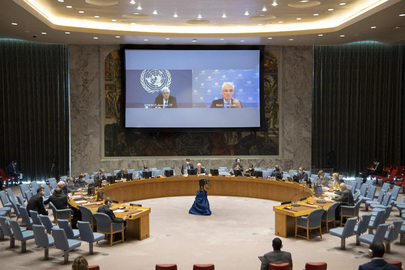
CRISIS ALERTS: Updates from the Security Council and Historical Security Councils of 1967 & 1990.

Contemporary Security Council
This morning, the Council deliberated in emergency session about human rights violations occurring in Yemen. The Security Council crafted a Presidential Statement condemning the human rights violations occurring within the Region.
The Representative from Belgium, Andrew S., is concerned with the direction taken by the Council . The Representative expressed disappointment that the Council did not approve the immediate request to bring in Iran, Saudi Arabia and Yemen as Parties to the Dispute after the news of human rights violations broke this morning. The Representative stressed that Belgium will not vote on any matters until Parties of the Dispute are brought in.
Historical Security Council of 1990
This morning, the Council was faced with a dire situation in the Middle East. This morning, the Republic of Iraq invaded Kuwait. The Councildiscussed allowing the Arab League six months to take control of the situation before taking any multilateral military action.
The Representative from Yemen, Shelby J., was displeased with the Council’s handling of the Situation: “Yemen desires that the Arab League have ultimate command authority over the peacekeeping operation regarding Iraq’s aggression. We plan to use the Arab League to negotiate with all parties involved for a solution with the least amount of bloodshed.”
Yemen remains confident that the Arab League can resolve the issue on its own.
The Council is working on multiple resolutions condemning the actions of Iraq and demanding the withdrawal of troops from Kuwait.
Historical Security Council of 1967
War broke out in Palestine on June 5, as ongoing conflict escalated. The Israeli Air Force had a significant victory in Egypt, in which Israel decimated an Egyptian airbase and took out command and control centers. Significant ground warfare continued at Sinai and Gaza. The Council passed resolutions HSC67-3 (concerning a ceasefire in Jerusalem) and HSC67-4 (concerning humanitarian aid efforts), with operative clause 5 divided out. HSC67-3 passed with a vote of 13 in favor, 0 opposed, and 1 abstention, with the concurrence of the Permanent Members. HSC67-4 passed with a vote of 11 in favor, 0 opposed, and 3 abstentions, with the concurrence of the Permanent Members. HSC67-5 was brought to a vote, with a vote of 10 in favor, 2 opposed, and 2 abstentions, but failed due to the non-concurrence of the United States of America.
Escalations continued with Syria striking Gaelili settlements, and Iraqi planes fired on communities in Northeast Israel. It is reported that Israeli planes returned to their bases to rearm and refuel mid-day.
General Odd Bull,Chief of Staff of the United Nations Truce Supervision Organization (UNTSO), sent in a telefax to the Secretary-General. Israel contacted the general to talk with Jordanians and keep them out of the war. Jordan responded, “[Israel] started the battle. They will receive reply by air,” and attacked with heavy artillery.
As of June 6, Israel has achieved air superiority in the West Bank. The Israel Defense Force also controls approaches to Jerusalem as it assaults the city. Egypt’s dug-in fortifications had been broken, and Syrians were shooting 45 tons per minute into North Israel. Session broke to continue discussions with representatives from Israel, Egypt, Syria and Jordan.
Keep Up With The Accords
More to read
The AMUN Accords is a premier resource for fact-based Model United Nations simulations. We are always looking for new contributors. Want to write for the AMUN Accords? Check out out the submission guidelines and then get in touch!


